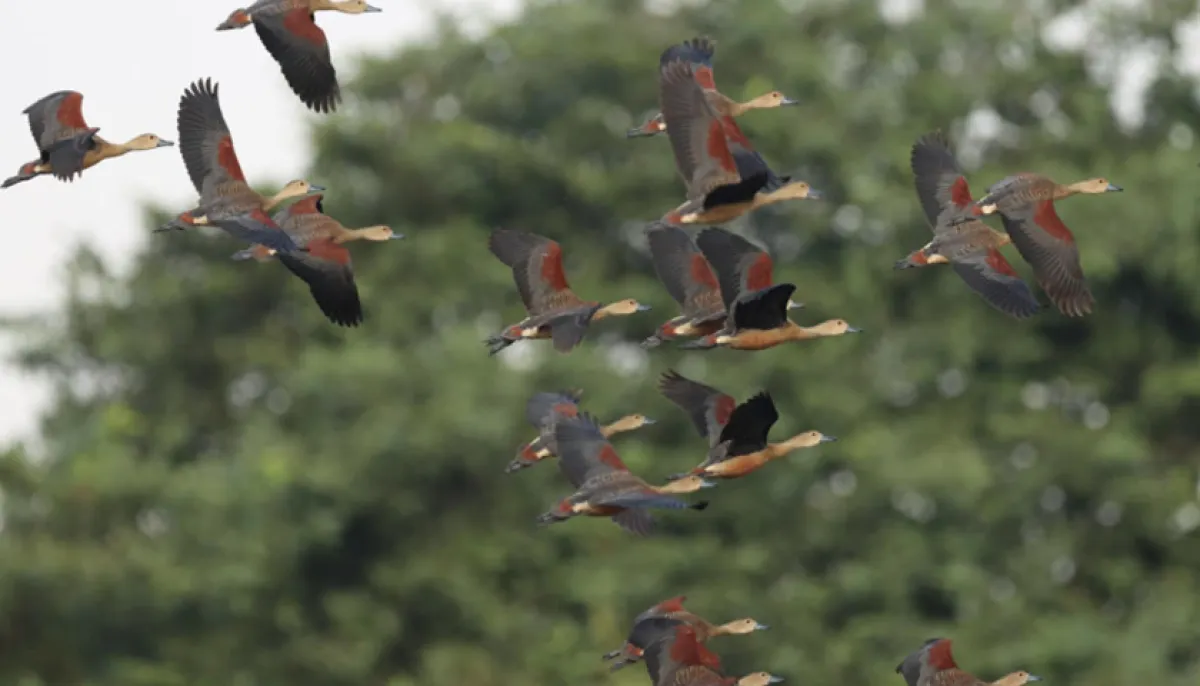
On misty winter mornings, the lakes and wetlands of Jahangirnagar University (JU) have long served as a vibrant sanctuary, adorned with floating water lilies and bustling with migratory birds from Siberia, Mongolia, China, Nepal, and other colder climes.
These birds dive, soar in unison, and gracefully skim across the glistening waters, their melodic calls echoing through the air. This mesmerising scene has been a cherished winter tradition at the university for years.
However, this year, things are different. Despite the near-end of winter and the vibrant flame of the forest all abloom, the usual chorus of chirping birds remains absent. The lakes, once teeming with life, now stand eerily silent, leaving nature lovers and students puzzled: why haven't the birds come round this year?
Experts in bird research and environmental studies attribute this decline to several factors, including unplanned high-rise construction, delayed lake restoration, deforestation, leasing out lakes for fish farming, and increasing human activity along the water bodies.
JU has around 14 lakes, with those near transport square, the Wildlife Rescue Centre (WRC), the new registrar's building, and the botanical garden historically attracting the highest numbers of migratory birds. However, in the past two years, bird activity in these areas has noticeably dropped, signalling a concerning shift on campus.
Aurittro Sattar, a bird researcher and environmental science major at JU, has spent the past five years studying these environmental changes. According to him, the accumulation of nutrients like nitrogen and phosphorus in water bodies has led to harmful algal blooms, dead zones, and fish kills. These issues are exacerbated by human activities such as sewage discharge, agricultural fertilisers, and aquaculture. Aurittro believes these disruptions in the ecosystem are major reasons for the decline in migratory birds this year.
In his studies, Aurittro identified several bird species that have stopped visiting, including the African knob-billed duck, cotton pygmy goose, common teal, yellow-wattled lapwing, and various bush birds like the Siberian rubythroat, Siberian stonechat, Bengal bushlark, yellow-crowned babbler, and Eurasian wryneck. Raptors, such as the long-legged buzzard, white-eyed buzzard, and the crested serpent eagle, have also seen a sharp decline.
Sharp drop in bird numbers
Using the point-counting method, Aurittro recorded that from late November to December, around 2,000 birds visited the university's lakes. Of these, 176 birds were recorded at the Al Beruni Hall lake, and 1,800 were spotted at the WRC lake. In contrast, between 2019 and 2022, the number of birds visiting the same areas during the same period was much higher—around 7,000 native and migratory birds. This year, only two lakes on campus hosted migratory birds. In one of these lakes, Aurittro counted 176 birds, including the lesser whistling duck, one fulvous whistling duck, one ferruginous pochard, and seven cormorants. In another lake, he recorded 1,765 lesser whistling ducks, 46 black-crowned night herons, 50 little cormorants, six Indian darters, and seven little egrets.
This dramatic drop in numbers over the past few years paints a clear picture of the environmental challenges affecting the university's lakes and the birds that rely on them.
Impact of human activity
Aurittro further said that fish-eating birds, such as little cormorants, little egrets, common kingfishers, and white-breasted kingfishers, were spread across eight lakes—far more than the dispersion of migratory ducks. This suggests a scarcity of aquatic plants, the primary food source for ducks, which were only found in sufficient amounts in the two lakes with higher bird activity.
Overcrowding, pollution, and blockages in the lakes have also disrupted the ecological balance, forcing the ducks to leave before the end of the season. Eutrophication has been observed in many lakes, and the buildup of water hyacinths has contributed to sediment accumulation, further decreasing water levels.
A call for action
"Monitoring programmes should be implemented to treat the lakes individually, focusing on sustainable ecosystem growth and restoration," Aurittro concluded.
When asked about the issue, Abul Kashem, deputy registrar of the estate branch, acknowledged the problem. He said, "This year, the lakes were not cleaned in time. Next year, we will ensure that the lakes are cleaned by June or July, before the birds arrive. Additionally, the university's lakes will no longer be leased out for aquaculture; we will make sure that they are free from such arrangements."
Source: The Daily star
